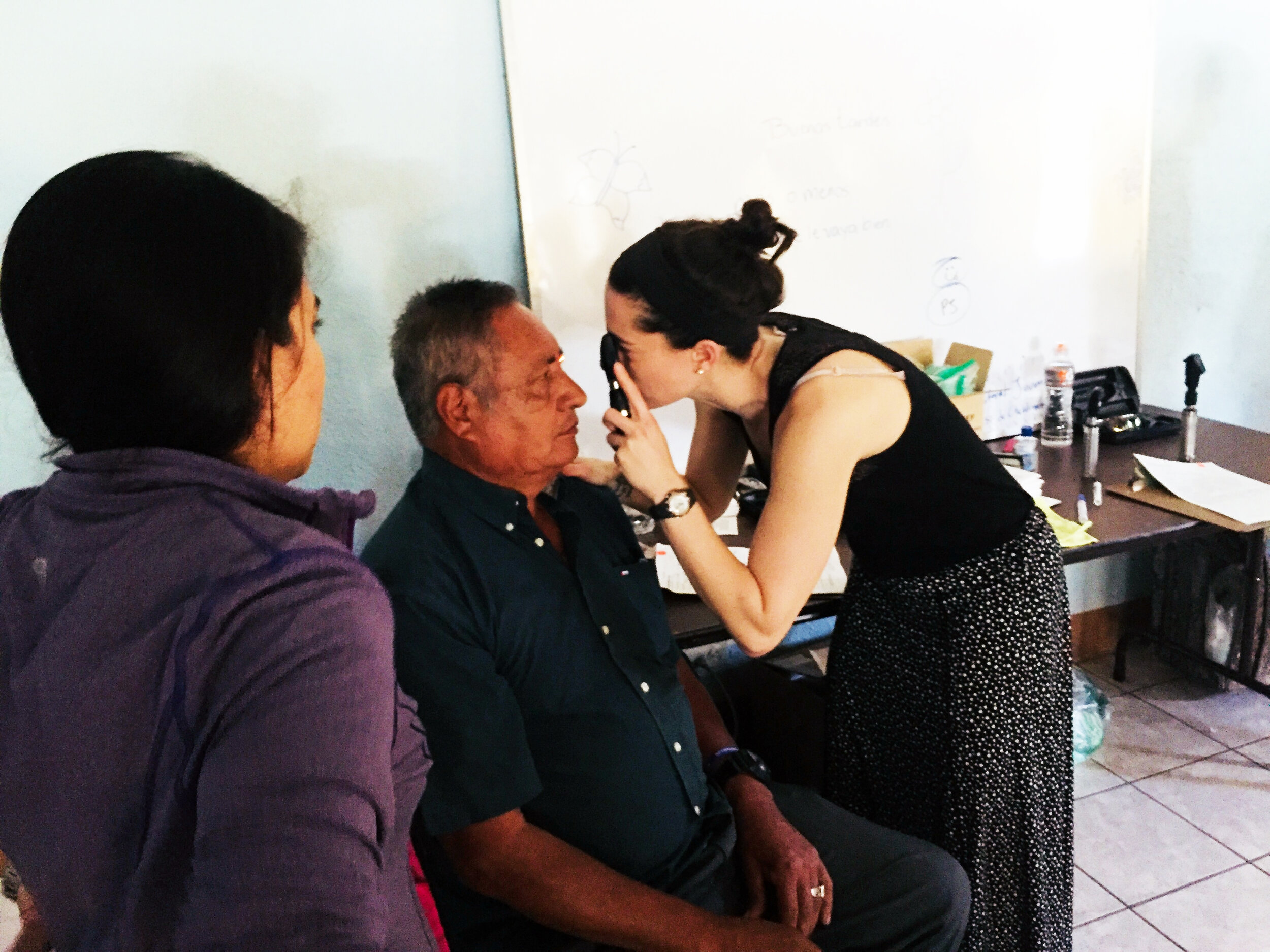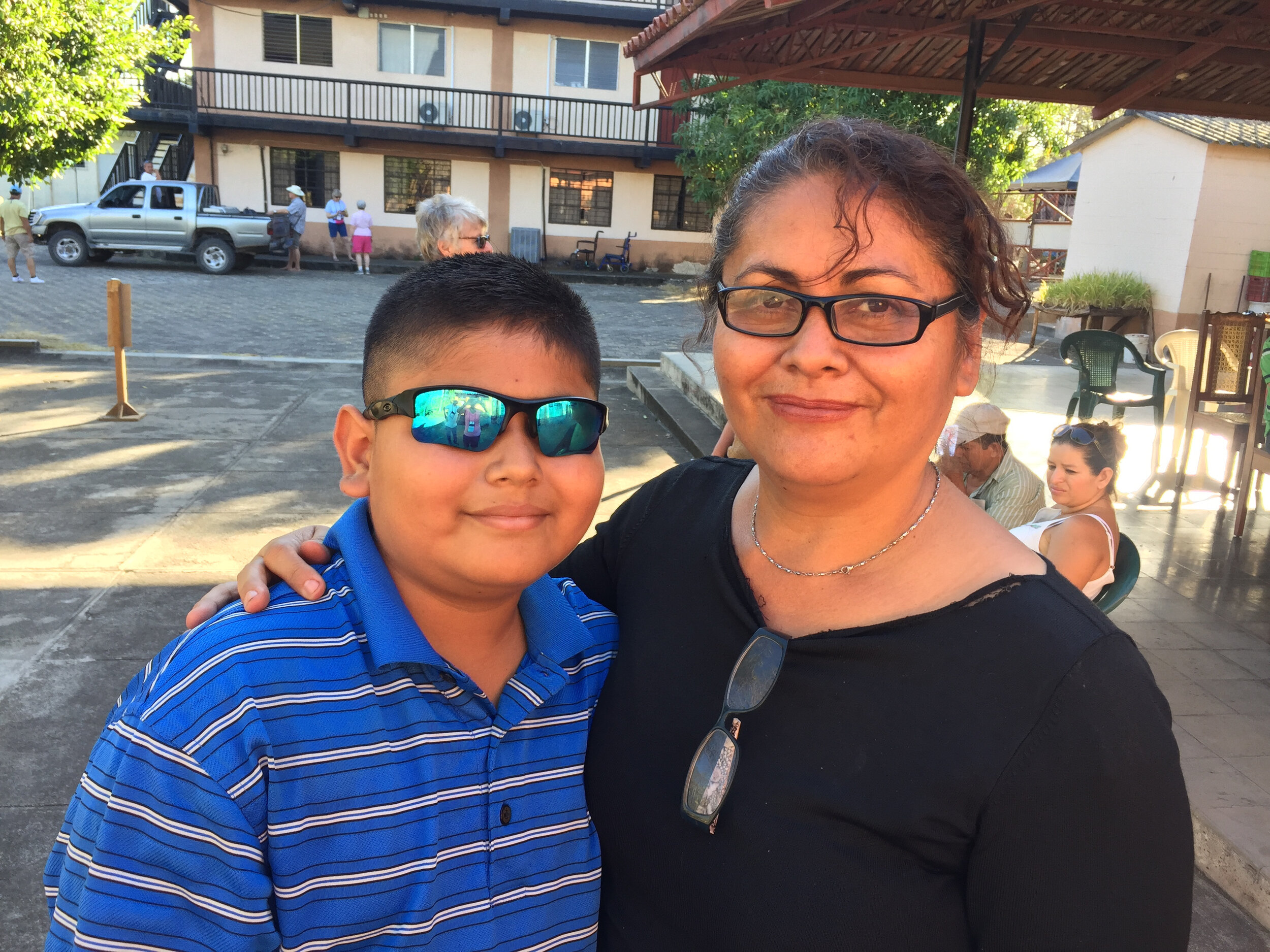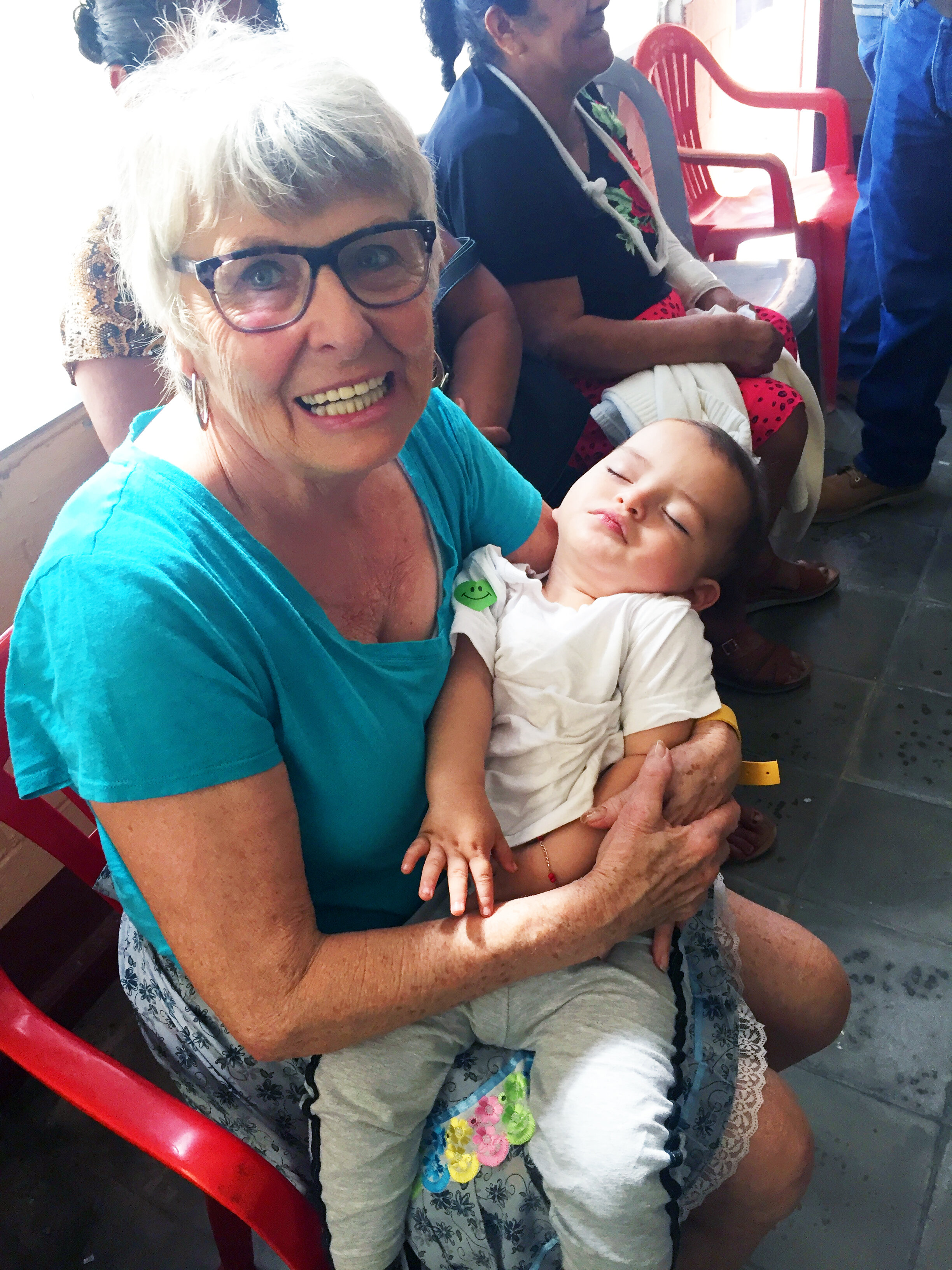Global Visionary: Stone Harbor Woman Isn’t Finished Helping Eyecare International’s Mission in El Salvador
Stone Harbor’s Cathy Hammer (back, second from left) and her sister Eileen Buchanan (front left) with Bishop Oswaldo Escobar Aquilar (from El Salvador), Father Rafael Fuentes, Fred Vigil, Terry Schaffer, Rich Irelan and Claudia Moore.
When the sun shines or glares on Seven Mile Beach, many of us slip on sunglasses for com-fort and eye protection. Exposure to sun-induced ultraviolet light can cause serious eye damage. Even on overcast days, the sun’s powerful rays can pass through clouds and haze.
The sun shines even more fiercely in Chalatenango, El Salvador, which is located nearly 970 miles from the equator. Temperatures typically range from 65 to 95 degrees in this region of Central America. The area’s clear, dry season begins in mid-November and ends in mid-April. Chalatenango’s weather tends to be mostly overcast the rest of the year.
Whatever the weather, many of Chalatenango’s residents, adults and children, don’t have the luxury of owning sunglasses, prescription eyeglasses or reader eyeglasses.
That’s why Eyecare International has been providing sorely needed care to the underserved in El Salvador since Dr. William Brinker, an Ohio ophthalmologist, founded the group in 1995. That’s also why Stone Harbor resident Cathy Hammer volunteered to assist the nonprofit, nondenominational organization with Catholic roots in providing improved vision for Chalatenangoans during one remarkably busy week in February of this year.
Hammer first learned of Eyecare International’s efforts during a Christmastime visit to her hometown of Sharon, Pa., in 2016. Dr. Bob Means, a family friend and Eyecare International board member, mentioned that he would return to El Salvador again in early 2017. Hammer was intrigued. So, the retired guidance counselor and family therapist questioned Means about Eyecare International’s efforts, particularly its missions.
More than a year later, Hammer and her sister, Eileen Buchanan, journeyed to the mountainous regions of El Salvador. Months before their departure, Buchanan cleaned, labeled and packed eyeglasses for shipping to El Salvador with a team of Eyecare International volunteers at the Center of Hope in Ravenna, Ohio.
“I’d never done anything like this before,” Hammer says. “It was way beyond my comfort zone!”
Still, she and her sister plan to go again next year. A close friend, former Spanish teacher Claudia Good, will join them.
Hammer chats enthusiastically as she describes details of her time spent in Chalatenango with some 50 to 60 other volunteers and the people they served.
After their flights to Central America, volunteers like Hammer and Buchanan spent their first night in a hotel near the San Salvador airport. Next, they traveled three hours north to Chalatenango. There, they bunked in Centro Upatore, a former Catholic retreat center with a dormitory-like setting and cold showers, on the site of their mission. The rookie volunteers quickly learned to keep their luggage closed so as not to invite occupation by native scorpions.
Day and night, dedicated armed guards watched over all on the eye clinic’s premises.
Wild dogs roamed about the area.
Hand-crafted items on those premises make clear the local people’s resourcefulness and creativity amid poverty, Hammer says. Smartly designed benches and borders around garden plots are built with bamboo. Edibles like chili peppers and cilantro are abound in those gardens. Another bench is carved from a chunk of a gigantic tree that has been hollowed. A hammock constructed with Fresco bottles hangs between two trees.
Group members had already set up the eye-care clinic with stations in tents and buildings before Hammer and Buchanan arrived there. Prescreening teams had traveled to 20 or more small villages the previous week to identify patients in need of surgery and to distribute tickets for treatments. The Roman Catholic Diocese of Chalatenango helped to spread word of the clinic.




Anywhere from 20 to 300 patients, who often arrived on crowded flatbed trucks or buses, lined up as early as 8am for eye examinations. Treatments began with registration in one tent and eye exams conducted with an E chart in another. People of all ages needing prescription eyeglasses were sent to air-conditioned buildings for screenings. In one building, doctors examined patients via a refractor machine, checked for cataracts, wrote prescriptions and more. Rows and rows of prescription and reader glasses ready for distribution to patients, as individually needed, were displayed in an orderly fashion on tables in another building.
Both Hammer and Eyecare International Program Coordinator Tad MacDonnell credit retired optometrist Warren Reigel and his wife, retired optician Mary Lou Reigel, of Ridgeway, Pa., for their dedication in keeping such order in Eyecare International’s inventory.
“We have approximately 15,000 prescription glasses, plus readers,” MacDonnell says.
Lions Clubs International provides most of Eyecare International’s eyeglasses. The Reigels do “the very time-consuming, detailed work” of sorting through donated glasses and entering prescription and inventory numbers into a computer daily throughout the year, he adds.
Eyecare International medical professionals and laypersons, all volunteers, conducted the operation with utmost efficiency, Hammer notes, adding, “Patients were treated with great respect.”
During the nine-day mission, Eye-care staffers treated 4,009 El Salvadorians. They distributed 2,162 pairs of reading glasses, 1,518 prescription glasses and countless sunglasses, says Hammer. Demand was so great, that volunteers ran out of 1.0 and 1.5 reading glasses and children’s eyeglasses. Moreover, doctors performed 50 surgeries to remove cataracts.
MacDonnell’s brother-in-law, ocularist Michael Hughes of Vienna, Va., created 68 custom prosthetic eyes for distribution during Eyecare International’s time in Chalatenango. Hughes works closely with local El Salvadorian Dr. Marcos Goenz, MacDonnell explains. After the volunteers leave, Goenz follows up in providing prosthetic eyes and eye care for patients who are oftentimes children.
Eyecare International can always use more hands on deck, MacDonnell says. Volunteers “learn on the fly,” as he did during his first mission five years ago. “Though this is a medical mission, lay people can contribute considerably,” adds the real estate industry retiree.
Many of the volunteer medical professionals, like the Reigels, are also retired. Thus, they are aging. While it is difficult for younger eye-care specialists to take time away from their practices and family vacations in order to volunteer, MacDonnell notes, more opticians and optometrists are definitely needed for future Eyecare International missions.
“The world could use more people like the Reigels,” says MacDonnell. “Eye-care International could also use more people like them.”
Monetary contributions, which are directly applied to updating medical equipment, are always appreciated, MacDonnell notes. Such donations can be sent to Eyecare International, 9824 Squaw Valley Drive, Vienna, Va. 22182.
While Lions Club International keeps Eyecare International well-stocked with prescription and reader eyeglasses, sunglasses for both adults and children are badly needed. Not only that, Eyecare International now collects baseball caps in all sizes to protect heads and eyes from damage done by the sizzling El Salvadorian sun.
Donations of sunglasses and baseball caps can be placed in an Eyecare International donation box on the first floor of the Stone Harbor Library, 9516 Second Ave.
Since Eyecare International’s foun-ding more than 20 years ago, people from Ohio, Pennsylvania, Virginia, Florida, Utah, Colorado, Texas, Alaska and Canada have given of themselves to improve the ocular vision of our global neighbors in El Salvador.
Now that Stone Harbor’s Hammer donates her time to Eyecare International, there’s at least one volunteer from New Jersey. Eyecare International would gladly welcome more.
Donations of sunglasses and baseball caps can be placed in an Eyecare International donation box on the first floor of the Stone Harbor Library, 9516 Second Ave., and monetary donations can be sent to Eyecare International, 9824 Squaw Valley Drive, Vienna, Va. 22182.

